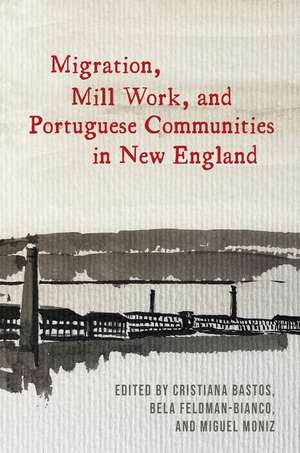Migration, Mill Work, and Portuguese Communities in New England: Non-Series Titles from Tagus Press
Editat de Cristiana Bastos, Bela Feldman-Bianco, Miguel Monizen Limba Engleză Paperback – 19 aug 2024
Preț: 244.57 lei
Nou
Puncte Express: 367
Preț estimativ în valută:
46.80€ • 48.68$ • 38.64£
46.80€ • 48.68$ • 38.64£
Carte indisponibilă temporar
Doresc să fiu notificat când acest titlu va fi disponibil:
Se trimite...
Preluare comenzi: 021 569.72.76
Specificații
ISBN-13: 9781951470272
ISBN-10: 1951470273
Pagini: 426
Ilustrații: 8 b&w and 41 color illustrations
Dimensiuni: 152 x 229 x 26 mm
Greutate: 0.82 kg
Editura: Tagus Press
Colecția Tagus Press
Seria Non-Series Titles from Tagus Press
ISBN-10: 1951470273
Pagini: 426
Ilustrații: 8 b&w and 41 color illustrations
Dimensiuni: 152 x 229 x 26 mm
Greutate: 0.82 kg
Editura: Tagus Press
Colecția Tagus Press
Seria Non-Series Titles from Tagus Press
Notă biografică
Volume Editors Cristiana Bastos, Bela Feldman-Bianco and Miguel Moniz are three anthropologists with converging interests on the Portuguese of New England.
Recenzii
“Migration and Mill Work. . .weaves together diverse aspects of Portuguese migration, labor movements, racialization, and the lives of individuals who shaped, resisted, and thrived in industrial New England. Through a blend of academic essays, personal testimonies, creative writing, and photographs, the authors offer a historical exploration of the Portuguese experience, challenging stereotypes and providing a deep understanding of the multifaceted intersections of ethnic/racial identity, labor, and society in New England.”—Dulce Maria Soares-Scott, Professor and Chair, Department of Social Work Criminal Justice, Anderson University
“Compared to other immigrant populations that have settled in the US during the third and now fourth waves of immigration, those with origins in Portugal and its various overseas territories are less well known. This book, which wisely focuses on the political economy of work in the textile industry, as well as on issues of race, class and gender, helps to enhance our knowledge of the Portuguese experience.”—Caroline B. Brettell, University Distinguished Professor of Anthropology Emerita, Southern Methodist University
“The editors of this timely and essential volume of essays focusing on the multilayered and indelible ways in which the textile mill economy shaped the lives of Portuguese immigrants in New England provocatively assert that by leafing through its illuminating pages readers will not only gain a better knowledge of the past but the inspiration to act upon the future. . .the nuanced and complex understanding of “who we are” that the book conveys also bears compellingly on our present, a moment in which the unprecedented pace and extent of migration poses immense logistical, economic, environmental, social, political and cultural challenges to migrating individuals as well as “sending” and “receiving” societies, countries and biomes.”—Luís Madureira, Professor and Chair, African Cultural Studies, University of Wisconsin – Madison
“Compared to other immigrant populations that have settled in the US during the third and now fourth waves of immigration, those with origins in Portugal and its various overseas territories are less well known. This book, which wisely focuses on the political economy of work in the textile industry, as well as on issues of race, class and gender, helps to enhance our knowledge of the Portuguese experience.”—Caroline B. Brettell, University Distinguished Professor of Anthropology Emerita, Southern Methodist University
“The editors of this timely and essential volume of essays focusing on the multilayered and indelible ways in which the textile mill economy shaped the lives of Portuguese immigrants in New England provocatively assert that by leafing through its illuminating pages readers will not only gain a better knowledge of the past but the inspiration to act upon the future. . .the nuanced and complex understanding of “who we are” that the book conveys also bears compellingly on our present, a moment in which the unprecedented pace and extent of migration poses immense logistical, economic, environmental, social, political and cultural challenges to migrating individuals as well as “sending” and “receiving” societies, countries and biomes.”—Luís Madureira, Professor and Chair, African Cultural Studies, University of Wisconsin – Madison

